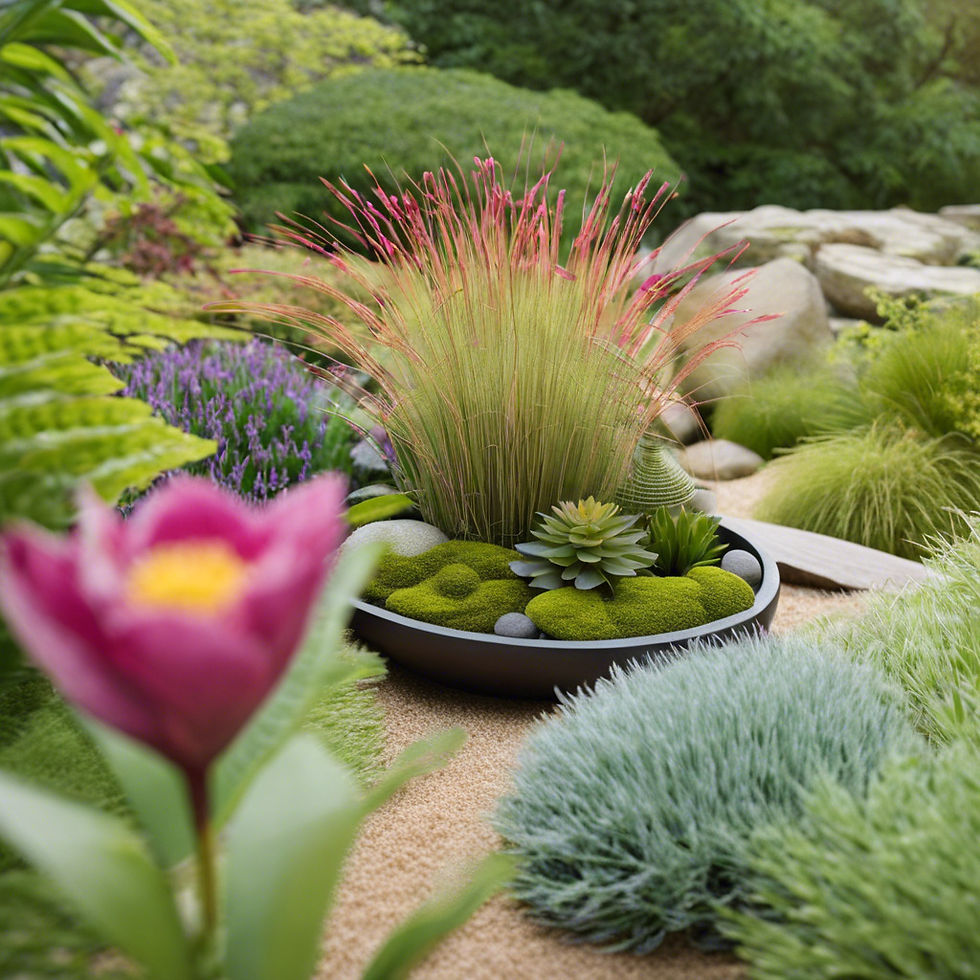Harmony in Nature: Zen Garden Plants Guide
- Serenity Wild
- Apr 28, 2024
- 3 min read
Discover the tranquility and beauty of incorporating Zen garden plants into your outdoor space with our comprehensive guide.

Exploring the Principles of Zen Garden Design
Zen gardens are known for their simplicity, minimalism, and focus on creating a peaceful and harmonious environment. The principles of Zen garden design can be explored through the careful selection of plants and their arrangement.
One of the key principles of Zen garden design is to create a sense of balance and tranquility. This can be achieved by using a limited number of plant varieties and arranging them in a way that creates a sense of harmony.
Another important principle is to create a sense of naturalness and serenity. Zen garden plants should be chosen for their ability to create a calming atmosphere and evoke a feeling of being in nature.
Zen gardens often incorporate plants that have symbolic meanings. For example, bamboo is often used to represent strength and flexibility, while cherry blossoms symbolize the transient nature of life.
By exploring the principles of Zen garden design, you can create a space that promotes relaxation, mindfulness, and a deeper connection with nature.
Selecting the Perfect Zen Garden Plants
When selecting plants for your Zen garden, it's important to choose varieties that are well-suited to the climate and conditions of your area. Native plants are often a good choice, as they are adapted to the local environment and require less maintenance.
Some popular Zen garden plants include moss, evergreen shrubs, ornamental grasses, and flowering trees. These plants can add texture, color, and interest to your garden while still maintaining a sense of simplicity.
It's also important to consider the size and scale of your Zen garden when selecting plants. Choose plants that will fit well within the space and won't overwhelm the overall design.
In addition to choosing the right plants, consider incorporating elements such as rocks, gravel, and water features into your Zen garden. These can further enhance the sense of tranquility and create a visually appealing landscape.
By carefully selecting the perfect Zen garden plants, you can create a space that is not only beautiful to look at, but also promotes a sense of peace and harmony.

Creating Balance and Harmony with Plant Arrangements
The arrangement of plants in your Zen garden is crucial for creating a sense of balance and harmony. There are several different techniques you can use to achieve this.
One technique is to create a sense of asymmetry. Instead of placing plants in a perfectly symmetrical pattern, arrange them in a way that feels natural and organic.
Another technique is to use negative space. Leave areas of your garden empty to create a sense of openness and simplicity.
You can also create balance by using contrasting colors, textures, and heights. For example, pair tall grasses with low-growing groundcovers, or mix plants with different leaf shapes and sizes.
Ultimately, the goal is to create a visually pleasing arrangement that promotes a sense of tranquility and balance. Experiment with different plant combinations and arrangements to find what works best for your Zen garden.

Maintaining Your Zen Garden Plants
Proper maintenance is essential for keeping your Zen garden plants healthy and thriving. Here are some tips to help you maintain your Zen garden:
Regularly prune and trim plants to maintain their shape and prevent overgrowth.
Remove any weeds that may appear in your garden. Weeds can disrupt the harmony and aesthetic of your Zen garden.
Water your plants regularly, taking care not to overwater or underwater them. Different plants have different water requirements, so be sure to research the needs of each plant in your garden.
Fertilize your plants as needed to provide them with the necessary nutrients for healthy growth.
Monitor your plants for any signs of pests or diseases, and take appropriate action to prevent or treat any issues.
By properly maintaining your Zen garden plants, you can ensure that they continue to thrive and contribute to the overall tranquility and beauty of your outdoor space.
Enhancing the Zen Experience with Fragrant Plants
Fragrant plants can add an extra dimension to your Zen garden, enhancing the sensory experience and promoting a deeper sense of relaxation and tranquility.
Some popular fragrant plants for Zen gardens include jasmine, lavender, rosemary, and ylang-ylang. These plants not only smell wonderful, but they also have calming and soothing properties.
Consider planting fragrant plants near seating areas or pathways in your Zen garden, so that their scent can be enjoyed up close.
In addition to their fragrance, many of these plants also have other beneficial properties. For example, lavender is known for its stress-relieving properties, while rosemary has been shown to improve memory and concentration.
By incorporating fragrant plants into your Zen garden, you can create a truly immersive and sensory experience that promotes relaxation and well-being.

Comments